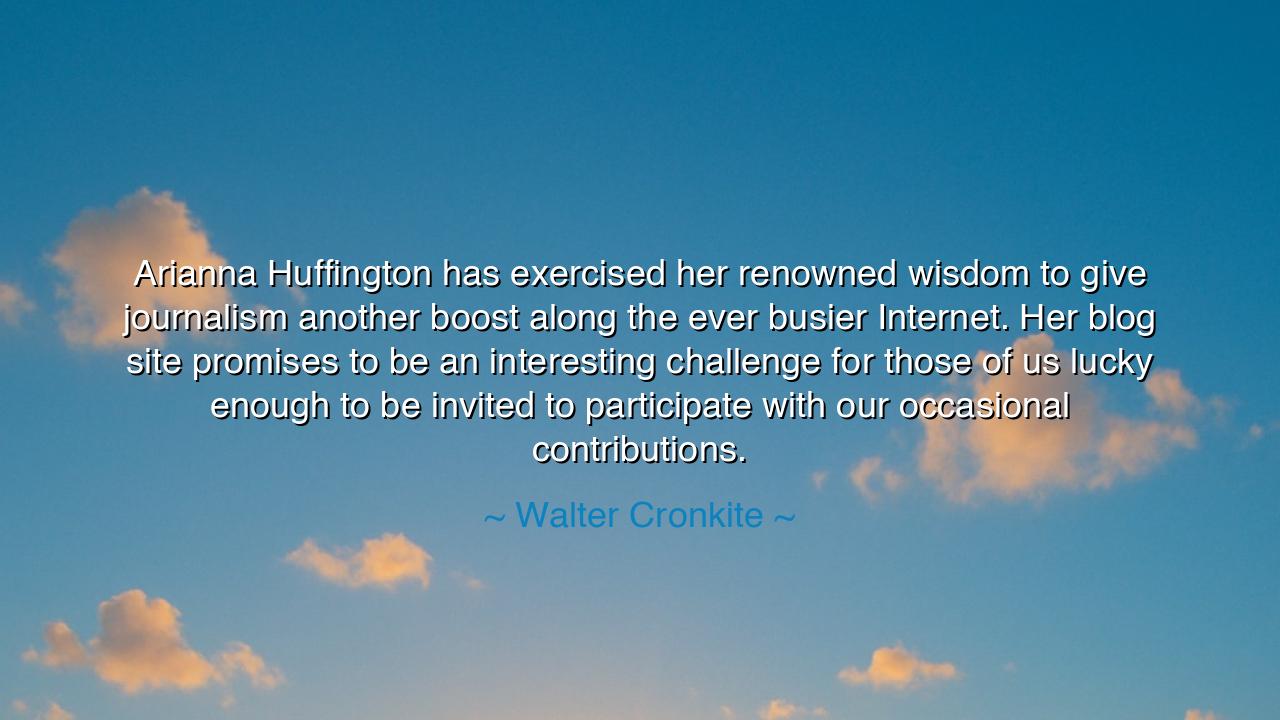
Arianna Huffington has exercised her renowned wisdom to give
Arianna Huffington has exercised her renowned wisdom to give journalism another boost along the ever busier Internet. Her blog site promises to be an interesting challenge for those of us lucky enough to be invited to participate with our occasional contributions.






Walter Cronkite, the trusted voice of a generation, speaks with both respect and foresight when he declares: “Arianna Huffington has exercised her renowned wisdom to give journalism another boost along the ever busier Internet.” In these words lies an acknowledgment that the ancient craft of truth-telling, once carried by the town crier, then by the printed press, and later by the glowing screen of television, must now adapt to the new realm of the Internet. Cronkite recognizes in Huffington a pioneer, one who wields wisdom not to preserve the old untouched, but to breathe life into it upon new ground.
The ancients themselves knew that every age transforms its message-bearers. The poets of Greece passed wisdom by the spoken word until the written scroll gave permanence to their song. Later, scribes in monasteries carried the torch of knowledge when empires crumbled. Each transition was met with doubt and fear, yet those with vision saw that truth must not die, but take on new form. So too does Cronkite speak of Huffington’s blog site as a vessel for journalism in a new age of voices and noise.
History offers a similar turning point in the life of Johannes Gutenberg. With his press, the Word leapt from cloistered script to the hands of the people. Many feared this new power, but it spread knowledge across continents, breaking the monopoly of the few and empowering the many. What Gutenberg’s press did for the Renaissance, the Internet promised for the modern world. Huffington, in Cronkite’s eyes, was one of those who harnessed its potential for journalism’s rebirth.
Cronkite also notes that her creation would be an “interesting challenge” for contributors. This is no small statement, for in a sea of countless voices, discernment is required to preserve the dignity of truth. Here, wisdom is not only in creating a platform, but in curating it, guiding the clamor into coherence, and ensuring that the flame of journalism does not flicker into mere noise. To participate in such a space was, in his view, both honor and test.
Let the generations remember: the mediums of truth may change, but the duty of truth endures. From scroll to press, from broadcast to blog, each age requires visionaries to carry the torch across shifting landscapes. Arianna Huffington’s work, praised even by the venerable Cronkite, stands as reminder that wisdom is not in clinging to old vessels, but in carrying the eternal flame of truth wherever new paths are forged. Thus does journalism, ever tested, endure—because the wise dare to renew it.






NTNguyen Thi Ngoc Tran
This statement leads me to reflect on the influence of leadership in shaping digital journalism. How much does the reputation and vision of a single individual, like Huffington, affect the tone, credibility, and reach of an online news platform? I’m also curious about the long-term implications: as more traditional journalists participate in blogs and online media, will this blend of established authority and digital innovation redefine how news is consumed and trusted?
NTHang Ninh Thi
I’m struck by the idea of the blog as both a platform and a challenge. Does this suggest that traditional journalists feel a sense of competition or adaptation when faced with new media? It also raises questions about collaboration in journalism—how do contributions from guest writers or occasional participants impact the voice and authority of the site? Could this model encourage experimentation, or might it risk inconsistency and uneven quality?
AHAnh Hung
This quote prompts me to think about the opportunities and pressures presented by online journalism. While digital platforms can broaden access and engagement, do they also create challenges in maintaining credibility, verifying facts, or upholding ethical standards? I’m curious how prominent figures like Huffington balance the need for timely, engaging content with the traditional values of rigorous reporting and careful editorial oversight.
TTTruc Truc
Reading this, I find myself reflecting on the intersection of reputation and innovation. Does Huffington’s personal authority give her a unique advantage in launching a digital platform, and can this model be replicated by others without similar prominence? I also wonder about the implications for the audience: how does one maintain journalistic integrity while encouraging contributions from diverse voices online, and what mechanisms are necessary to ensure quality and accuracy?
GDGold D.dragon
I’m curious about what Cronkite means by describing Huffington’s blog as an 'interesting challenge.' Does this refer to adapting traditional journalistic principles to the online space, or to competing with the volume and speed of digital media? It raises questions about how established journalists perceive the transition from print and broadcast to blogs and social media, and whether these platforms truly offer a meaningful expansion of journalistic influence.